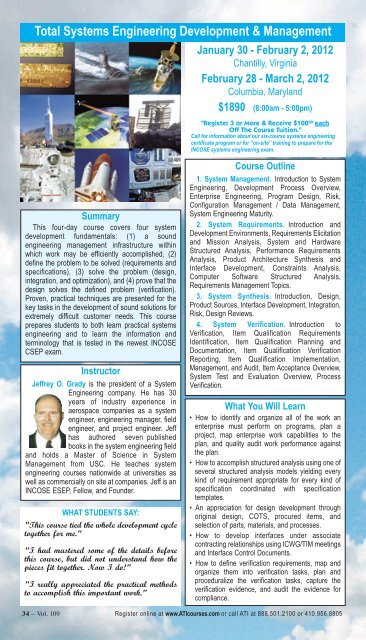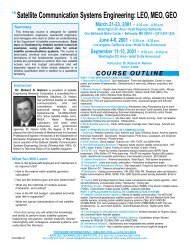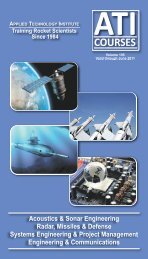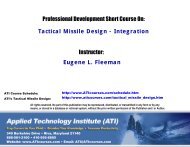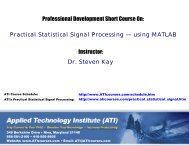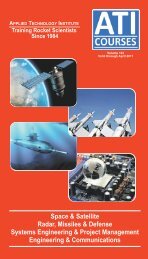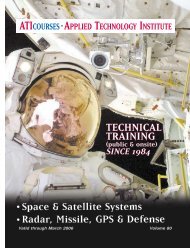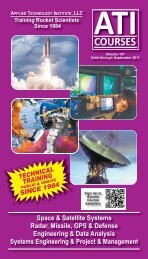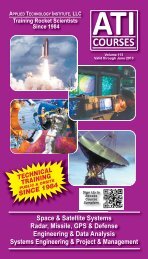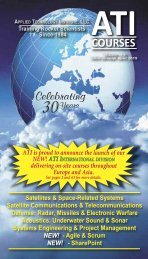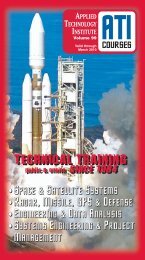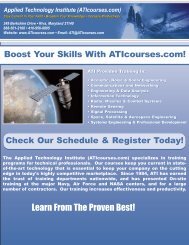Acoustics & Sonar Engineering Radar, Missiles & Defense Systems ...
Acoustics & Sonar Engineering Radar, Missiles & Defense Systems ...
Acoustics & Sonar Engineering Radar, Missiles & Defense Systems ...
You also want an ePaper? Increase the reach of your titles
YUMPU automatically turns print PDFs into web optimized ePapers that Google loves.
Total <strong>Systems</strong> <strong>Engineering</strong> Development & Management<br />
January 30 - February 2, 2012<br />
Chantilly, Virginia<br />
February 28 - March 2, 2012<br />
Columbia, Maryland<br />
$1890 (8:00am - 5:00pm)<br />
Summary<br />
This four-day course covers four system<br />
development fundamentals: (1) a sound<br />
engineering management infrastructure within<br />
which work may be efficiently accomplished, (2)<br />
define the problem to be solved (requirements and<br />
specifications), (3) solve the problem (design,<br />
integration, and optimization), and (4) prove that the<br />
design solves the defined problem (verification).<br />
Proven, practical techniques are presented for the<br />
key tasks in the development of sound solutions for<br />
extremely difficult customer needs. This course<br />
prepares students to both learn practical systems<br />
engineering and to learn the information and<br />
terminology that is tested in the newest INCOSE<br />
CSEP exam.<br />
Instructor<br />
Jeffrey O. Grady is the president of a System<br />
<strong>Engineering</strong> company. He has 30<br />
years of industry experience in<br />
aerospace companies as a system<br />
engineer, engineering manager, field<br />
engineer, and project engineer. Jeff<br />
has authored seven published<br />
books in the system engineering field<br />
and holds a Master of Science in System<br />
Management from USC. He teaches system<br />
engineering courses nationwide at universities as<br />
well as commercially on site at companies. Jeff is an<br />
INCOSE ESEP, Fellow, and Founder.<br />
WHAT STUDENTS SAY:<br />
"This course tied the whole development cycle<br />
together for me."<br />
"I had mastered some of the details before<br />
this course, but did not understand how the<br />
pieces fit together. Now I do!"<br />
"I really appreciated the practical methods<br />
to accomplish this important work."<br />
"Register 3 or More & Receive $100 00 each<br />
Off The Course Tuition."<br />
Call for information about our six-course systems engineering<br />
certificate program or for “on-site” training to prepare for the<br />
INCOSE systems engineering exam.<br />
Course Outline<br />
1. System Management. Introduction to System<br />
<strong>Engineering</strong>, Development Process Overview,<br />
Enterprise <strong>Engineering</strong>, Program Design, Risk,<br />
Configuration Management / Data Management,<br />
System <strong>Engineering</strong> Maturity.<br />
2. System Requirements. Introduction and<br />
Development Environments, Requirements Elicitation<br />
and Mission Analysis, System and Hardware<br />
Structured Analysis, Performance Requirements<br />
Analysis, Product Architecture Synthesis and<br />
Interface Development, Constraints Analysis,<br />
Computer Software Structured Analysis,<br />
Requirements Management Topics.<br />
3. System Synthesis. Introduction, Design,<br />
Product Sources, Interface Development, Integration,<br />
Risk, Design Reviews.<br />
4. System Verification. Introduction to<br />
Verification, Item Qualification Requirements<br />
Identification, Item Qualification Planning and<br />
Documentation, Item Qualification Verification<br />
Reporting, Item Qualification Implementation,<br />
Management, and Audit, Item Acceptance Overview,<br />
System Test and Evaluation Overview, Process<br />
Verification.<br />
What You Will Learn<br />
• How to identify and organize all of the work an<br />
enterprise must perform on programs, plan a<br />
project, map enterprise work capabilities to the<br />
plan, and quality audit work performance against<br />
the plan.<br />
• How to accomplish structured analysis using one of<br />
several structured analysis models yielding every<br />
kind of requirement appropriate for every kind of<br />
specification coordinated with specification<br />
templates.<br />
• An appreciation for design development through<br />
original design, COTS, procured items, and<br />
selection of parts, materials, and processes.<br />
• How to develop interfaces under associate<br />
contracting relationships using ICWG/TIM meetings<br />
and Interface Control Documents.<br />
• How to define verification requirements, map and<br />
organize them into verification tasks, plan and<br />
proceduralize the verification tasks, capture the<br />
verification evidence, and audit the evidence for<br />
compliance.<br />
34 – Vol. 109 Register online at www.ATIcourses.com or call ATI at 888.501.2100 or 410.956.8805


